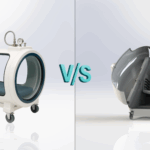“Microwave ovens will kill you!” Or so they say… If you’ve ever surfed the internet for information on health and nutrition, there’s little doubt you’ve come across scare stories about microwave ovens. Online natural health “experts” claim that microwaves will “zap” your food, deplete it of important nutrients and alter its molecular structure in dangerous ways. They also warn that microwave exposure and eating food cooked in microwave ovens will cause harm to your body and even cause cancer!
Is there any truth to any of these reports? Why are some people so paranoid about an appliance that has been used safely by millions of people for decades? Should you stop using a microwave oven for reheating leftovers, making frozen dinners or cooking your vegetables, potatoes, meat, oatmeal or other foods?
These are important questions because: A) your health is your number one priority and B) the microwave oven, while it may not replace a conventional oven and certainly doesn’t produce better tasting food, is unquestionably one of the greatest time savers and conveniences you can have in your kitchen.
You’re not only about to get the answers, this also will be the last article about the microwave controversy you’ll ever have to read because it demolishes the microwave myths with undeniable proof: facts, science and evidence… not urban legends and fear mongering.
What started all the internet scare stories?
 Rumors are often started and circulated on the internet without anyone ever confirming the source. Did you ever get one of those random emails that said something like, “10 reasons to throw out your microwave” and then forward it right on to a friend, just assuming it was true? (go ahead, fess up).
Rumors are often started and circulated on the internet without anyone ever confirming the source. Did you ever get one of those random emails that said something like, “10 reasons to throw out your microwave” and then forward it right on to a friend, just assuming it was true? (go ahead, fess up).
A large part of all the microwave alarmism today can be traced back to a single story that was spread on the internet until it went viral and was eventually accepted as factual. It’s the story of the infamous “Swiss research” done by “food researcher” Hans Hertel, who allegedly performed his own private study to see how microwaved foods affected the results of blood tests. A typical iteration of the story goes like this:
“The use of microwave ovens in cooking can alter the structure of nutriments in foods, making it difficult for the organism to make use of them. Hertel discovered that food cooked or thawed in a microwave oven could cause changes in the blood, indicating that a process of illness is developing. SIMILAR CHANGES ARE ALSO FOUND IN THE CASE OF CANCER.”
As with most alarmist nutrition nonsense on the net, this one also involves the ubiquitous conspiracy theory. The story continues:
“The best studies about the use of microwaves to heat food were purposely kept from consumers. Hertel was efficiently “gagged” by Swiss microwave oven producers. For over 10 years, Hertel has fought for the right to tell the world what he’d discovered.”
Actually the best studies are NOT kept from consumers, they are peer reviewed, replicated and published in scientific journals where we can actually look them up. Alas, we cannot access Hertel’s “research” to judge its validity because it was never published.
In fact, by Hertel and his follower’s own accounts, this “study” was just himself, Bernard Blanc (who later recanted) and six of their buddies who locked themselves in a hotel room and conducted a personal and arguably non-scientific and non-controlled experiment. This is not real research; it was never verified or replicated by other researchers. Yet you see Hertel quoted in almost every “microwaves equal death” article on the Internet, a good tipoff that everything else in the article is suspect as well.
Microwave ovens, radiation and the cancer scare
One tactic used by microwave scaremongers is to instill fears about radiation and cancer. When people hear the word radiation, they tend to freak out. I suspect that even people who understand that we’re not talking about a nuclear accident, gamma rays or x rays still have an uncomfortable feeling about “radiation” cooking their food (after all, we call it “nuking” right?)
But when we talk about microwave “radiation” we are simply talking about production of thermal energy, aka, heat. Radiation and radioactive are NOT the same thing. Celeste Robb-Nicholson, M.D. from the Harvard Health Review explains:
“Microwaves do not cause cancer. They’re a form of non-ionizing radiation and thus cannot ionize tissue. Microwave ovens use low-frequency waves of electrical and magnetic energy to produce heat to cook food. They don’t make food radioactive, nor do they trigger cancer-causing genetic mutations.”
A search of the medical literature brings up absolutely nothing linking microwave cooking to cancer.
The research says that concern over cancer causing compounds such as heterocyclic amines (HCAs), and polycyclic aromatic hydrocarbons), would be better directed toward educating consumers on the charring and blackening that occurs when grilling or barbecuing muscle meats, rather than cooking the meat in microwave ovens.
In fact, cooking in a microwave can actually REDUCE the formation of HCAs. This quote comes from the National Cancer Institute (www.cancer.gov):
“Studies have shown that microwaving meat prior to cooking helps to decrease mutagens by removing the precursors. Meats that were microwaved for 2 minutes prior to cooking had a 90-percent decrease in HCA content.”
Microwave radiation leaks
Although microwaves are a form of non-ionizing radiation, you wouldn’t want prolonged exposure to them at high power any more than you’d want to stick your head in the conventional oven on high and leave it there. You also wouldn’t turn the temperature up in your house to 325 degrees to roast a turkey – the idea is to cook the bird, not you. So what if the microwaves get OUT of the oven? Could they hurt you then?
In the early days of the microwave oven, leaks were more of a concern due to imperfect oven designs. Due to federal standards and improved engineering today, experts agree that this is now a non-issue. According to the FDA, there is little cause for concern about microwaves leaking from the oven unless the door hinges, latch or seals are damaged. (you can always buy a leak detector if you’re paranoid).
[Flooding your body with oxygen reduces the chances of cells becoming cancerous. Hyperthermia ozone therapy in an ozone steam sauna is very effective]
If you’re still worried, simply back away from the microwave while it’s running. Microwave energy rapidly dissipates as you move away from the source. Also, the way microwaves are manufactured, the second the door is open the device shuts down and no radiation leaks out after you’ve opened the door.
Do microwave ovens alter the molecular structure of food in unhealthy ways?
NO! There’s no evidence that microwave cooking alters the molecular structure of the food in a damaging and unhealthy way.
At Mercola dot com, which claims to the #1 natural health website online, the controversial alternative-natural health doctor Joseph Mercola has published alarmist articles that have spread microwave worries all across the internet like wildfire.
Mercola claims that microwave ovens are a toxic threat to you and your family. He says that “microwaving distorts and deforms the molecules of whatever food or other substance you subject it to.”
Well, no kidding the molecules change; that’s called cooking and the molecular changes caused by cooking a food in a microwave are no different and no more harmful than the heating of a food any other way.
Conveniently, Dr. Mercola, who has received numerous warning letters from the FDA for making unsubstantiated claims in marketing, will be glad to sell you his convection oven after you read his article that scares you into throwing out your microwave.
Mercola also claims that “your microwave turns your beautiful, organic veggies, for which you’ve paid such a premium in money or labor, into “dead” food that can cause disease.”
Wrong again. There’s been no human research ever published to prove that microwaved foods cause disease, just a bunch of conspiracy theories and alarmist rantings.
However, a Dutch study in 1995 that was published in the journal Food Chemistry did conduct a toxicity experiment on rats using human food that found the opposite. The researchers intentionally subjected the food to misuse treatment by reheating in a microwave repeatedly to make sure to concentrate any potentially harmful substances. The tests were exhaustive and no harmful effects were found:
“Criteria to assess toxicity included clinical observations, ophthalmoscopy, growth, food and water intake, haematology, clinical chemistry, urinalysis, organ weights, micronucleated erythrocytes in bone marrow, gross examination at autopsy and microscopic examination of a wide range of organs. The results indicate no adverse effects of the diets cooked by microwave compared with those cooked conventionally.”
Do microwave ovens zap the nutrition right out of your food?
What about the criticisms that nutrients get “zapped” right out of the food when you “nuke” them? They’re factual aren’t they? There’s a sliver of truth to this, but all cooking can destroy nutrients. What the microwave critics don’t tell you is that microwave cooking can actually preserve nutrients better than some other cooking methods like boiling. Minerals hold up particularly very well.
At least two studies did raise concern over major flavonoid losses in broccoli and one over vitamin C. One of the studies showed a 97% loss of flavonoids in the broccoli, which has been the basis of the “microwaves zap nutrients” myth ever since. If microwave fear-mongers actually read the studies however (imagine that), they would see that the major nutrient losses were created by cooking the veggies in a lot of water.
Nutrient losses while microwaving depend mostly on cooking power, cooking duration and volume of cooking water. The studies did not conclude that you shouldn’t cook in a microwave oven, they concluded that steaming is the preferred method for retaining the most nutrients in vegetables and that if you cook broccoli or other veggies in a microwave, don’t overcook them and don’t cook them in water.
Vitamin losses from cooking meat in the microwave have also been studied. A 1998 study from Japan showed a 30% loss of vitamin B-12 from cooking meats in a microwave. However, it’s not a massive nutrient loss compared to boiled vegetables and since B-12 is heat sensitive, similar losses occur from conventional cooking as well, so once again it’s not a microwave-exclusive problem.
Many people don’t care for microwaved meat anyway (the common joke is “tastes like rubber”), but all things considered, studies say that microwaving your veggies is not a bad way to cook them. In fact, some research says microwaving retains more nutrients due to the fast cooking times. A 1982 study by Cross and Fung published in Critical Reviews in Food Science and Nutrition concluded:
“Overall, the nutritional effects of microwaves on protein, lipid, and minerals appear minimal. A large amount of data is available on the effects of microwaves on vitamins. It is concluded that there are only slight differences between microwave and conventional cooking on vitamin retention in foods. In conclusion, no significant nutritional differences exist between foods prepared by conventional and microwave methods. Any differences reported in the literature are minimal.”
Will microwaves destroy your precious protein?
Here’s an issue that concerns some of us bodybuilders and fitness minded folks: Does microwave cooking damage or denature protein? This too has been researched and once again the microwave fear-mongers are wrong when they claim that microwaving ruins the protein.
In the Journal of Scientific Food Agriculture, Jonker and colleagues wrote:
“In general, the nutritive value of proteins in foods is comparable, whether cooking is done by microwaves or conventional means…”
Cooking at high temperatures has potential to denature protein, but that’s an excess heat issue, not a microwave oven issue. The amount of denaturation depends on how long and at what temperature the food is cooked. Some of the more delicate biological subfractions could be damaged or destroyed in proteins like whey, but that doesn’t mean the protein quality or amino acids themselves are destroyed.
On a related macronutrient note, research from Poland studied the effect of conventional cooking versus microwaving on essential fatty acids in herring. There was no damage to the omega-3 fatty acids.
Non uniform heating of food: Caution! Watch out for hot spots!
Have you ever noticed how some parts of your microwaved food are cooked thoroughly and others are still luke warm or even cold? It can definitely be annoying, but experts have expressed a serious concern over the potential for burns in adults, children and infants because one portion of the food can be cool or warm and another scalding hot.
Microwave technology has improved over the years to help mitigate this “hot spot” problem (including rotating carousels), but non-uniform heating is always somewhat of an issue to be aware of when consuming food cooked with microwave ovens.
This problem is easily solved with a little common sense and caution. Just mix or stir your food, and let it stand briefly before eating it. Eat hot food with caution.
Bacteria worries
Health alarmists often publish claims that deadly and dangerous bacteria can survive in foods cooked in a microwave oven. There have indeed been case studies published in medical journals about listeria, ecoli and salmonella. But guess what – it can happen with any cooking method if the meat isn’t cooked completely.
Microwave ovens are used most often for reheating food, but some people use microwaves to cook raw meats. Because microwave ovens may heat food non-uniformly, if you try to you cook a whole, stuffed chicken in the microwave, some areas may not get cooked completely, so ecoli or listeria, if present, may not be destroyed.
If you don’t want to take any chances, don’t cook whole raw chickens in the microwave!
Same thing with eggs. Lightly cooked eggs could harbor salmonella. Whether you’re using a microwave or a conventional stovetop to cook eggs, make sure they’re fully cooked. Salmonella risk from eating raw eggs is very low, but eat them raw at your own risk (you only need ONE good case of food poisoning in your lifetime to never ever want to experience it again).
By the way Rocky Balboa wannabes, a study from the Journal of Nutrition showed that eggs are more digestible when they’re cooked, not raw.
Exploding eggs?
Speaking of eggs, this may sound strange, but there have been at least four papers published in medical journals which reported cases of eye injuries from the explosion of microwaved eggs.
One published in the journal of ophthalmology in 1998 wrote up two case studies and said that the flying hot eggs caused serious injuries:
“The first patient required limbal conjunctival transplantation and a subsequent penetrating keratoplasty in the right eye and prolonged treatment of superficial keratitis in the left eye. The second patient sustained bilateral corneal epithelial defects and unilateral intrastromal hemorrhage.”
I don’t cook my eggs in the microwave, I think they have the texture of rubber. But if you nuke yours, ironically, there’s more legitimacy to a rare freak exploding hot egg accident than the ridiculous claims of cancer.
Also, on a slightly tangential, but related note, the eye is a vulnerable organ due to the anatomy and physiology of the lens, so it’s prone to overheating with overexposure to microwaves. This would only be a danger in the kitchen if your microwave oven screen or door mechanism were faulty and you sat there with your nose pressed up against the glass (see section on radiation leaks above).
Microwaved milk and infant formula dangers?
Anti microwave websites often mention that microwave-heated baby formulas and breast milk should not be fed to infants, based on potential damage to the milk itself or potential burn injuries.
One study from the Stanford University School of Medicine was published in the journal Pediatrics. They tested 22 human milk samples for lysozyme activity, total IgA, and specific secretory IgA to E coli by heating them by microwave at various low and high power settings. They concluded that microwaving appears to be contraindicated at high temperatures due to nutrient damage, and questioned microwave use even at lower temperatures.
The Stanford study is selectively quoted all the time by anti-microwave groups. What about the rest of the research? A study published in the International Journal of Food Science and Nutrition said, “microwave heating of human milk can be performed without significant losses of examined immunoglobulins and nutrients, provided the final temperatures are below 60 degrees C.”
Also, let me quote Jonker again from The Journal of Scientific Food Agrigulture:
“When the microwave treatment is well controlled to avoid overheating, such biological properties as the clotting activity of plasma and antibacterial activities are reasonably maintained.”
As I mentioned earlier, it appears that overheating any food with any cooking method could destroy a small portion of the nutrients, but it doesn’t make the food harmful to eat. As noted above, heating in a microwave does not create or add any toxic compounds to foods or drinks.
Superheated liquids? (It made “MYTHBUSTERS”)
Burns are a possible safety concern due to the uneven heating of food. There’s also a potential danger for anyone to get scalded due to overheated liquids (or steam).
In microwave ovens, the water can become superheated past its boiling point and yet bubbles don’t form. When the liquid is disturbed or something is dropped in it, like sugar, the heat is released, and it’s possible for boiling water to bubble over and out of the container.
There’s an urban legend that that microwaved water can explode in your face. While it may not explode literally, this is not a complete myth – microwave water or hot beverages can bubble over aka “erupt” due to the superheating phenomenon (water in a liquid state that is over 100 degrees celsius). This was actually tested on an episode of MythBusters.
Burns from liquids could happen to adults, children or infants from overheating or spills. In one unfortunate case study from a hospital, the teat from an infant’s bottle that had been heated in the microwave exploded scalding hot milk on the child resulting in extremely serious burn injuries to the face, mouth, trachea, palate, pharynx and esophagus.
Of course, grown adults have been known to burn themselves in kitchen mishaps or even on McDonalds coffee (and then sue). But don’t blame the microwave (or Mcdonalds), just be careful of hot stuff, folks. Hot stuff burns, you know.
What about about plastics releasing toxins into the food?
Lots of people are worried about cooking in plastic containers these days. Can’t chemicals leach out of the plastic and into your food? Sometimes they can. But that’s what microwave-safe containers are for.
A Greek study found that dioctyladipate (DOA) and acetyltributylcitrate (ATBC) plasticizers from food-grade PVC and PVDC/PVC leak into olive oil and water when cooked in the microwave.
A study from the European food research and technology journal found that DOA and ATBC plasticizers from plasticized poly(vinyl chloride) and poly(vinylidene chloride/vinyl chloride) films migrated into ground meat of varying fat content during microwave heating.
The most recent concerns have been over Bisphenol A (BPA), a plasticizer used in polycarbonate plastics such as storage containers, bottles and even can liners. How much can leach into food, under what circumstances and what are the health consequences are hotly debated and this subject goes far beyond the scope of this article.
Even though there’s some truth to the concerns about plastics, they’re often overblown and mixed in with myths (the dioxin chain email hoax comes to mind). And of relevance to our discussion, this is not a microwave problem, it’s a heating of certain plastics problem.
The simple solution: use only plastic containers that are microwave-safe or to be absolutely sure, stick with corning ware, ceramics or microwave safe glass. If you cook with saran wrap in the microwave, avoid direct contact of the wrap with the food. Do not use cold storage containers or foam insulated containers in the microwave either.
The Real Danger: Getting second hand natural health information off the internet
As you can see, there are some legitimate microwave oven safety issues to be aware of, but they’re no different than basic cooking safety with any kind of conventional oven, stovetop, grill or fire.
If you pay attention, you’ll notice that nearly all of the “gloom and doom” stuff is uncritical, propagandist pseudoscience coming from the “alternative health,” “natural health” or “raw foods” movements (by the way, some nutrients become more bio-available when cooked).
Some of the people and organizations who spread this misinformation are honest and sincerely believe in what they’re saying. But as physicist Robert Park wrote in Voodoo Science, “what may begin as honest error has a way of evolving through almost imperceptible steps from self-delusion to fraud.” True to that point, some are using scare tactics as tools for marketing or furthering their agendas.
Other people are just “out there.” I swear some of them are conspiracy theory, tin foil hat and little green men types.
I’ve had some of these natural health alarmists tell me that there’s no research proving microwaves are safe and we have no way of knowing they won’t cause cancer in the long term. Well no kidding you can’t prove a negative, but that line of argument alone shows the fallacy in their way of thinking. Enormous amounts of research have been done for decades on microwaves and any physicist or food scientist can explain to you how they work to safely cook your food.
To many of these internet kooks, “research” means quoting other natural health websites, which in turn, quote other natural health sites and regurgitate urban legends. Even authorities with real credentials like M.D. are fallible and not above reproach.
Sources:
____________________________________________________________________________
Have you ever experienced a freak accident with a microwave?
_____________________________________________________________________________






5 comments
Join the conversationAre Microwaves safe? | CookingPlanet - August 1, 2011
[…] Are Microwaves safe? […]
Reader - August 7, 2011
Great information! I’ve been looking for something like this for a while now. Thanks!
Jason - August 8, 2011
Your blog is one of a kind, i love the way you organize the topics. 😀
rtyecript - August 24, 2011
I really liked the article, and the very cool blog
realflight - March 7, 2012
So relieved. I can’t live without microwave oven~